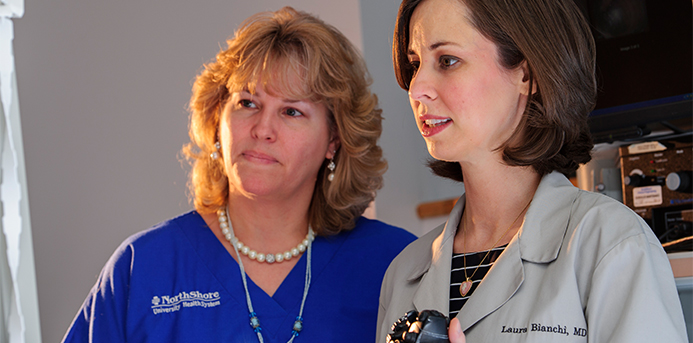Have you celebrated your 50th birthday? If so, it’s time for a colonoscopy. If you need some extra motivation to make that (admittedly daunting) appointment, consider this: 150,000 people will be diagnosed with colon cancer and 50,000 people will die from the disease this year, according to the American Cancer Society. The lifetime risk of developing colorectal cancer is about 1 in 20, and it is the second-leading cause of cancer-related deaths in the U.S.
“We can prevent colon cancer with this great test, the colonoscopy, which detects early cancer,” says Laura K. Bianchi, MD, Director of the NorthShore University HealthSystem Women’s Gastroenterology (GI) Cancer Risk and Prevention Program.
Bianchi feels strongly that more can be done to prevent colon cancer, particularly for women, many of whom wrongly assume it is a men’s disease. She says only about 50 percent of women over age 50 are regularly screened for colon cancer. By contrast, about 80 percent of women receive regular cervical and breast cancer screenings.
“We need to have the colonoscopy on the radar just like a mammogram and cervical test [pap smear],” Bianchi says.
Colon cancer develops from polyps that grow on the lining of the colon in 30 to 50 percent of the population. Over time, generally over 10 years, polyps may grow larger and more advanced and develop into colon cancer. Polyps are more common as we age, and approximately 10 percent of them will develop into cancer.
“It is a highly preventable cancer because we take out the polyps that lead to cancer,” Bianchi says.
Because of the effectiveness of the colonoscopy and expanded insurance coverage, colon cancer deaths for people over 50 have actually declined over the last 20 years. However, the incidence is increasing for 25 to 49 year olds.
For Carey Gifford, 39, a Wilmette mom of four young girls, a colonoscopy detected her early cancer. With no family history and a healthy lifestyle, Gifford was not at risk for colon cancer. Gifford previously had some digestion issues, so she had a relationship with Bianchi. After noticing some rectal bleeding, Gifford agreed to a colonoscopy, which showed a larger, cancerous polyp that was removed during the procedure. There was concern that the cancer had invaded the wall of the colon so Gifford underwent surgery to remove 6 inches of her colon where the polyp had been growing. Fortunately, the cancer had not spread and Gifford has been cancer-free since the surgery. She goes back for a screening every year and was just cleared to come back every two years. Gifford urges women under 50 to pay attention to their bodies and get a colonoscopy if necessary.
“It’s one day of your life,” she says. “I know two other younger women who have been diagnosed with colon cancer.”
While Bianchi performs nearly 1,000 screens per year, she is working with her team to increase the number of colonoscopies by working through patient barriers and making the procedure as easy and relaxing as possible. Aromatherapy, music and appropriate sedation can all help alleviate anxiety.
Bowel preparation is an important component of a good colonoscopy to allow for a clear view of the colon:
- The day before the test, you stick with a clear liquid diet, including broths.
- The evening before the test, you consume the first of two oral laxative doses.
- You will most likely have one purge before you go to bed.
- Fasting begins at midnight and continues through to the test the next day.
- In the morning you consume the second laxative dose and experience another purge.
There are two levels of sedation offered patients. Conscious sedation is the standard of care. You are awake but relaxed and can respond to commands. The deeper sedation requires monitored anesthesia care. You don’t hear anything and wake when the procedure is over. Bianchi encourages patients to talk to their physician ahead of time to determine the appropriate level of sedation.
During the procedure, the colonoscope, a thin, flexible tube with a camera, is used to look at the entire colon. Air is used to inflate the colon to allow for a clear view of the lining. If polyps are discovered, they are removed during the procedure and sent for biopsy.
Colonoscopy is recommended beginning at age 50, but for those with a family history of colon cancer, the test should be done sooner. New symptoms in people under 50 should not be ignored in order to avoid a delayed diagnosis. You should visit your GI doctor if you experience any of the following symptoms:
- Rectal bleeding
- Change in bowel habits
- Abdominal pain
- Anemia
Bianchi points out modifiable risk factors that may help prevent colon cancer:
- Don’t smoke
- Drink alcohol in moderation
- Maintain a healthy body weight
- Stay physically active
- Eat a diet focused on fruits, vegetables, whole grains, and low in red and processed meats
If you enjoyed this article, please also read:

